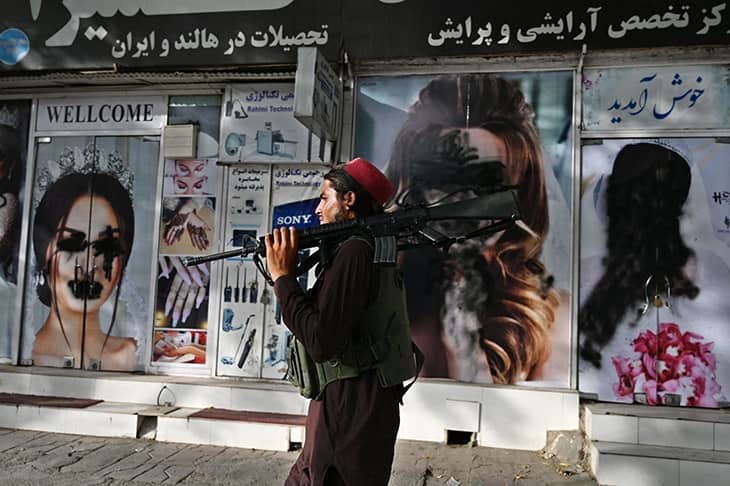I lived in Kabul for nearly ten years. I had a house there for many years and I loved being there. I loved the sense of life on the edge — even at the risk of sudden death — and the extraordinary array of interesting people who visited. I later became a partner in a fuel distribution business in Kabul, with a contract to supply the jet fuel used by Nato. We supplied $2 billion worth of jet fuel, amounting to around 100,000 tons a month, giving Nato the ability to bomb the Taliban.
Several Afghans worked for me, friends as well as colleagues, and over the past few weeks I’ve been trying desperately to get them out of the country, but have come up against the brick wall of government bureaucracy. One of my old colleagues was also, for ten years, an interpreter for British forces. We were promised by the government that all such people would be given asylum in Britain.
But this promise — which they and I believed — turns out to be utterly empty. I recently received a formulaic civil service email which read: ‘Regrettably these cases fall outside the MoD-administered Afghan Relocations and Assistance Policy (ARAP) because it is not relocation of former locally employed staff of HMG in Afghanistan.’ According to official Ministry of Defence figures, of the 6,500 applications for the ARAP scheme, just 1,200 were accepted, 3,500 rejected and the rest left to linger in the system. In the case of the interpreter, his rejection is nonsense. He worked for numerous British officers who provided written references. And anyway, why should my other colleagues, who risked their lives to provide support to Nato, be consigned to death? These people are not economic migrants crossing the Channel in an inflatable dinghy. Rather, they are people who have — in the words of the UN Refugee Convention — ‘a well-founded fear of being persecuted’ and who have done our state some service.
I have spent hours on a government ‘helpline’ for Afghans at risk listening to a recorded message which says that employees of western NGOs will be -evacuated. Presumably this includes staff of those Potemkin villages-cum-Sloane Ranger summer camps that flourished as aid projects in Kabul post-2001, and of the NGO skateboard park built in Bamyan to ‘empower children through skateboarding and education’.
Yet it does not include people who worked for me providing vital aid to Britain and its allies nor even, we now know, all the -interpreters for British forces. The post-war collapse of British power has never been more humiliatingly obvious.
Kabul is already like a city of the dead, one of my former employees tells me. He moves from place to place at night to avoid the Taliban. They have been seizing mobile phones from people, and beating those who won’t provide them. One of their objectives is to check the phones to see if individuals have contact with westerners. ‘Sooner or later, they will come after us. It looks like the whole world has turned their back on us,’ my old colleague says. ‘We are very disappointed and mostly feel hopeless. Our only hope is you at the moment — please help us get out.’ Even if they escape the Taliban, recent reports suggest that millions of Afghans might well run out of food before winter and that public services are close to collapse.
Last Monday, my friend told me that the Taliban are kidnapping Tajik boys and men, especially Panjshiris from Kabul, to use as hostages. The Taliban’s promise not to conduct revenge killings has, unsurprisingly, proved meaningless. There are reports of splits in this ragtag army, with the troops quite happy to slit the throats of their enemies in the Panjshir Valley — regardless of what the leaders in Kabul might say about restraint. The UN reports that there are ‘credible allegations’ of reprisal killings of some former Afghan military members. Let’s go back to the 1951 UN Refugee Convention where the UK agreed to take in anyone with ‘a well-founded fear of persecution’. Where is that duty now?
Cecil Rhodes said to his compatriots: ‘Remember you are an Englishman and you have consequently won first prize in the lottery of life.’ Afghans have, so far, won the booby prize. The least we can do for those who worked for us in Afghanistan is to let them come and rebuild their lives here. I’ve lived and worked among Afghans for decades and I know they believe in hard work and education. We would be lucky to have them.






Comments